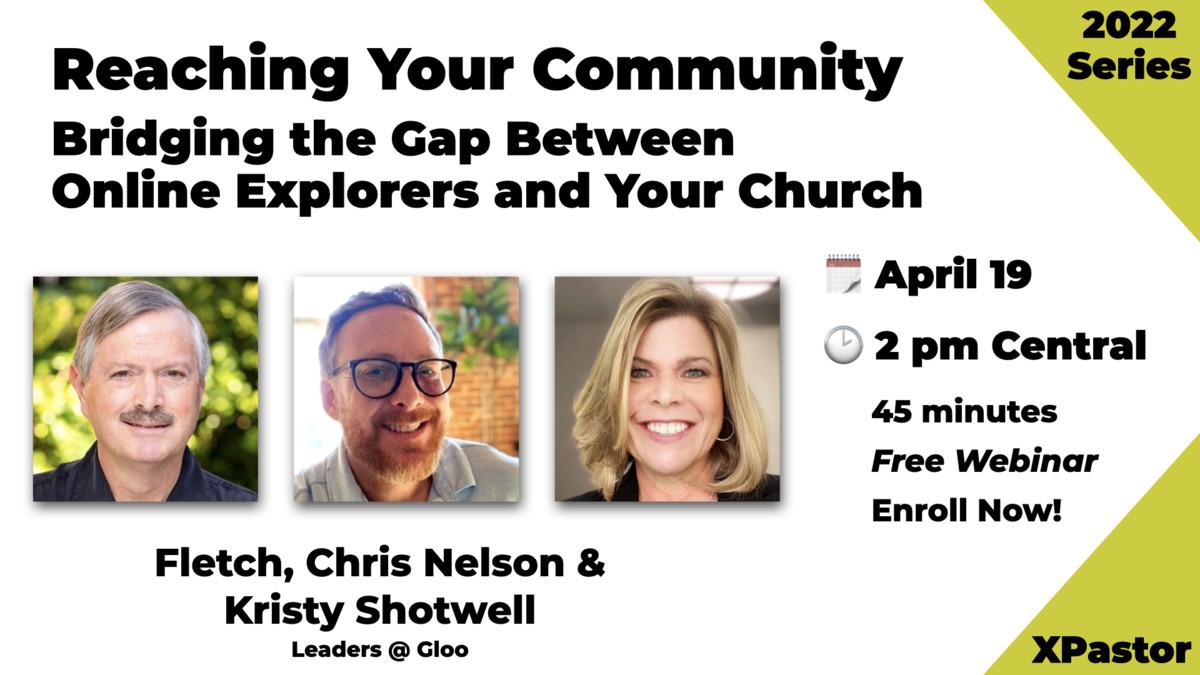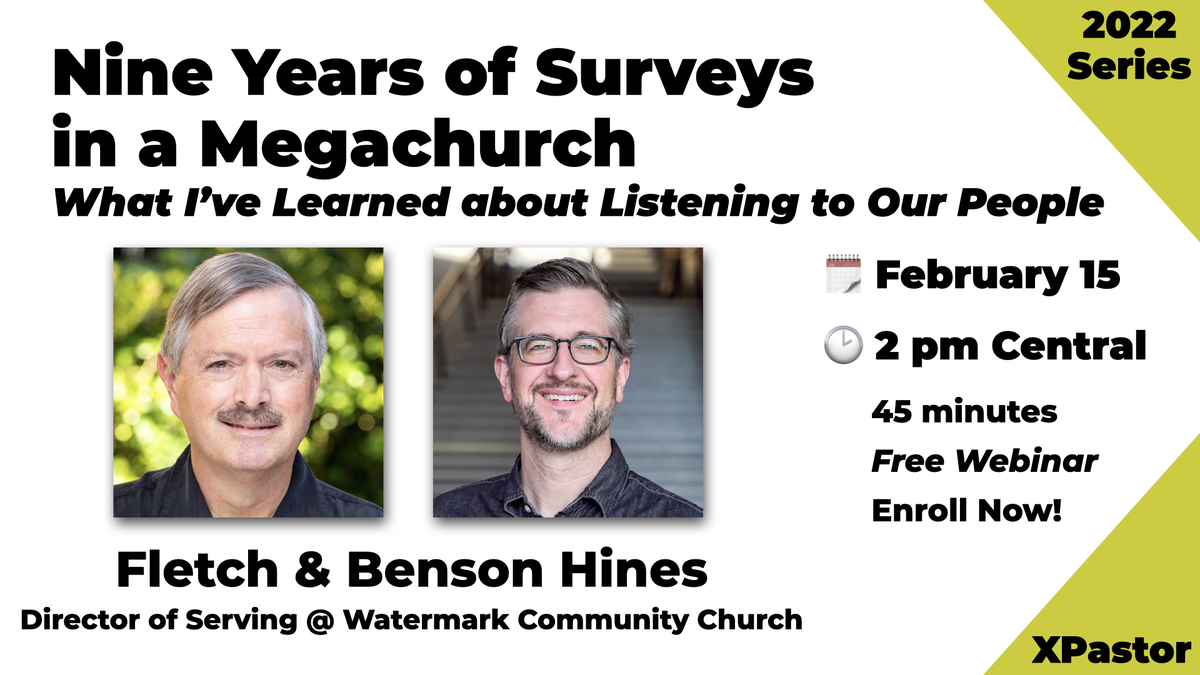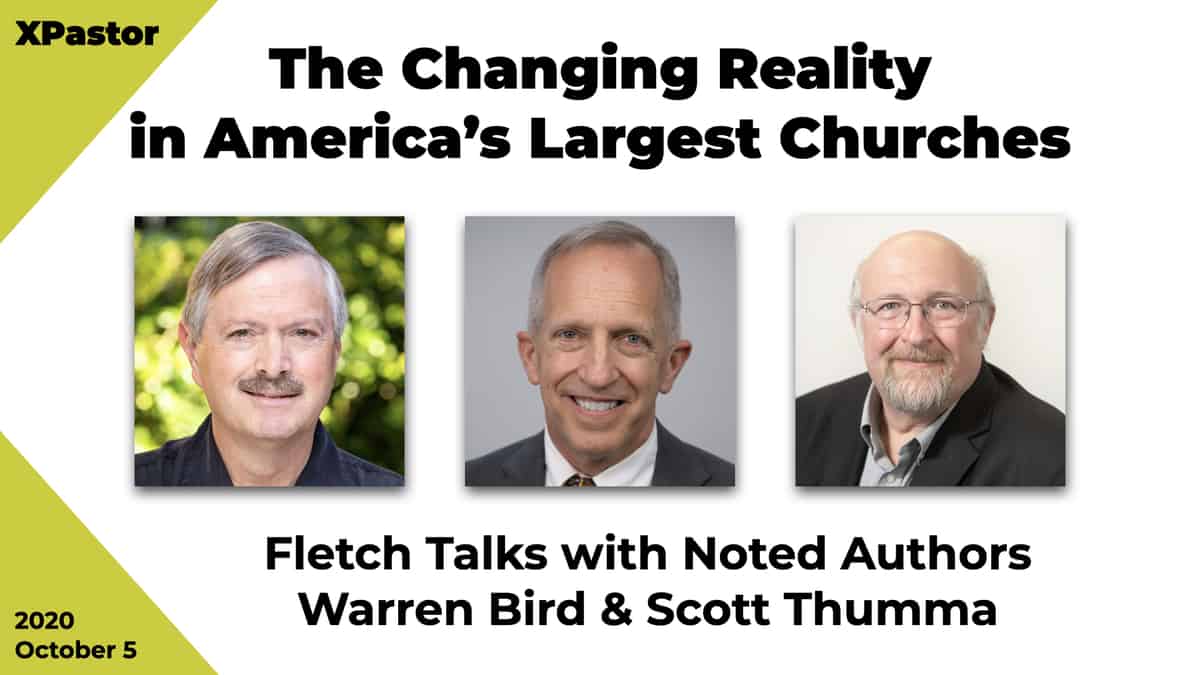The main segment in most worship services is the sermon. It receives the most time and is pivotal for teaching biblical truth. Yet, almost everyone listening to the sermon forgets it by Wednesday. Church leaders hope for life change in the congregation but it may not be happening through the sermon as currently delivered. This is the nationwide case of the forgotten sermon.
44% of a select group of church leaders reported that by Monday of any given week, the congregation had forgotten the sermon from the day before. When you add the results for Sunday through Wednesday, the total of forgotten sermons climbs to a staggering 94%.
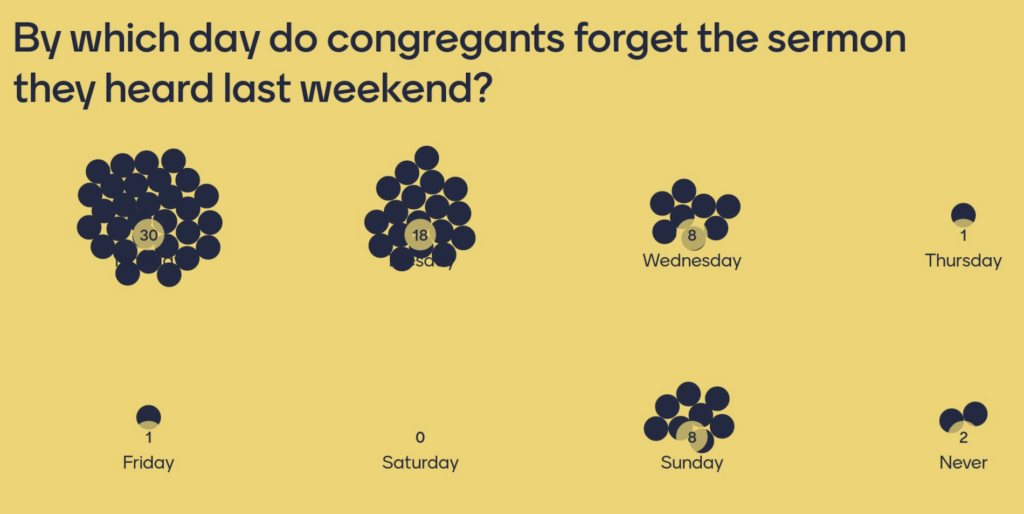
That number is a disaster of epic proportions. Senior Pastors regularly invest 20 to 25 hours a week in study, preparation and delivery of the sermon. The data from the survey points to an enormous lack of short-term application and long-term life change by the Sunday sermon.
There is hope and humor to come, so slog through the data to get to that.
The Data
A survey was taken at the 2022 XP-Seminar. In its 18th year, the XP-Seminar brings together 200 church leaders—mostly Executive Pastors and a few Senior Pastors. It is an assembly of the XP tribe, not the town.
Thus, the survey at the Seminar is not a scientific sampling of the entire American church. Perhaps the master researcher Warren Bird or the people at Barna can do that.
It is startling and alarming that leaders of so many churches at the Seminar resoundingly noted the problem of the forgotten sermon.
The question asked was: By which day do congregants forget the sermon they heard last weekend? See the pie chart with the percentages.
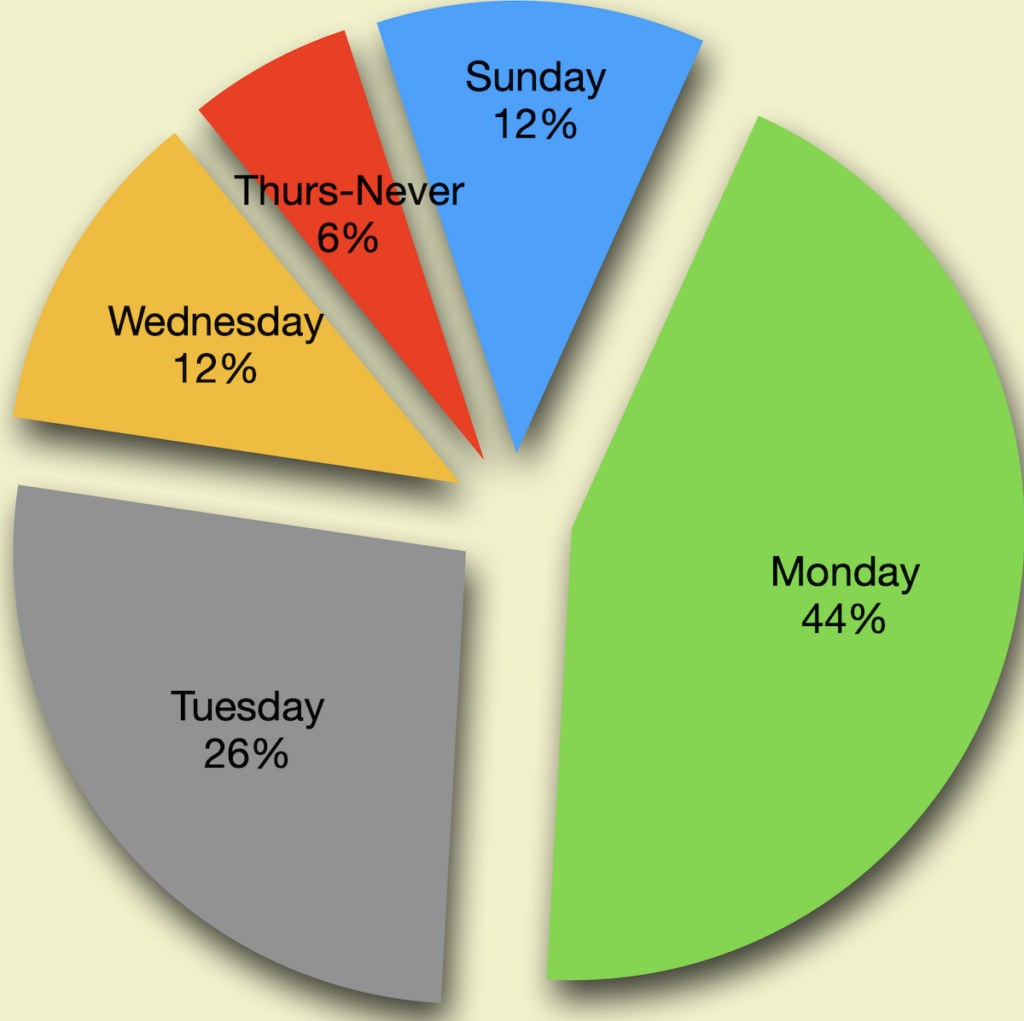
By which day do congregants forget the sermon they heard last weekend?
Those same church leaders thought that a little more than half of the congregants would take action on the message:
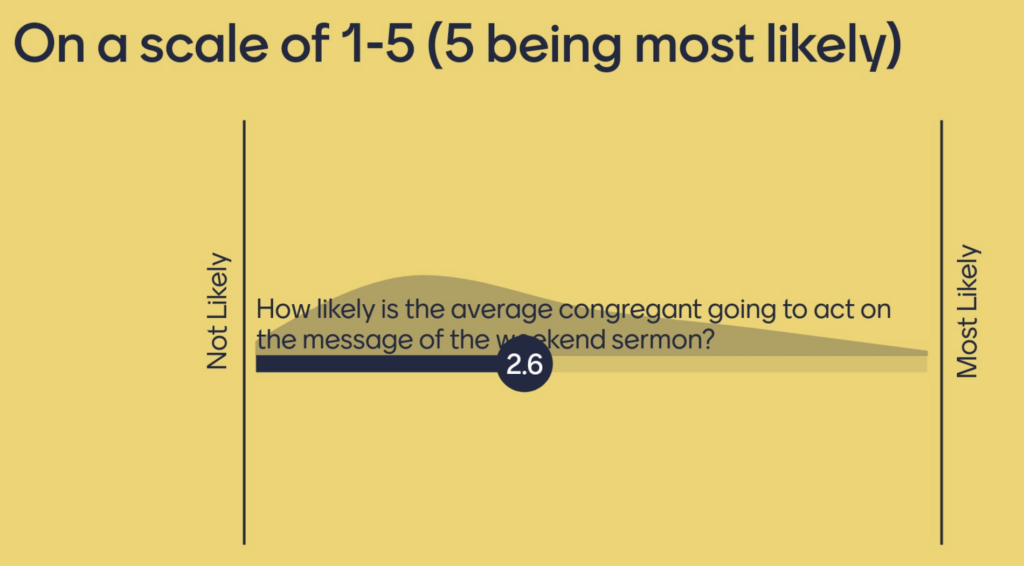
If people are going to take action on the message, then it has to happen by Wednesday. Otherwise, 94% of people will suffer the syndrome of the forgotten sermon.
How to Improve
At the XP-Seminar, Kurian Babykutty, who represented Bleat, demonstrated a simple tool to canvas the congregation in real time during the sermon. Further, he demonstrated a cell phone-based follow-up to help remind people to take action steps on the sermon. Kurian says:
The clues for engagement lie in Scripture itself. Let’s remember the parable of the sowers. Preaching to people who forget the sermon quickly, seems similar to sowing seeds on rocky ground and thorns. In fact, in James 1:23, the Word itself challenges us to not be deceived by merely listening to the Word and not doing what it says.

Kurian Babykutty
Bleat developed a simple tool to remind the congregation to take action on the sermon by Wednesday of the same week. Kurian commented:
Bleat realizes that church leaders can win the weekend only by making the Word fruitful in the lives of the congregation throughout the whole week. So it lets preachers bring their sermons to life by encouraging the listeners to commit to one related action during the week. Congregants can commit to this change by interacting with their mobile devices anonymously at the end of the sermon.
The tool shows responses in real-time, giving pastors immediate feedback, again from Kurian:
A real-time display on screen will show how many people are committing to take action. As the numbers go up, the updated numbers often positively encourage others to commit to taking this action during the upcoming week. They will be prompted to set reminders for when they’d like to be reminded to take this action. A follow-up notification will then ask them if they were able to complete this action that they committed to at the end of the last sermon.
The goal is not data for the sake of data, but giving people a chance to respond to the message. Kurian desires the goal of people taking action on the message:
While all the data remains anonymous, pastors can see throughout the week how many people are completing the actions that they committed over the weekend. They can also see the commitment-to-completion ratio across each day of the week. Life group leaders can see this data for attendees in their group and this can spark healthy conversations about why some were able to act on the sermon and what might help others to take similar actions.
The thinking behind the tool is for people to change their habits. Kurian encourages people to move from being listeners to the sermon, to active participants:
Importantly, Bleat aims to help the Word bear fruit in people’s lives by helping two groups of people develop two tiny habits that can significantly and spiritually shape their behavior. It encourages church leaders to ask people to do something about the sermon and it invites congregants to act on the Word and make it fruitful in their lives.
Sermon-based small groups are another way to reinforce Sunday’s message. Many churches have 25% to 50% of their people in small groups, but they may not all be sermon-based discussions. The question remains, if your church has 50% of the congregation in a small group, what will the other 50% use to apply the sermon during the week?
Tracking
If the data didn’t scream loudly enough about how quickly we forget Sunday’s message, we also know that churches are not tracking if people take action on that message.
93% of the respondents reported that they have no mechanism to track if a congregant takes action on the sermon:
Churches track finances, attendance and other key metrics. The data indicates that for the most significant portion of the Sunday service, the sermon, that no mechanism is in place to track application. In the words of Apollo 13, Houston, we have a problem.
Humor
There is some humor in all this. We think that half of the congregation will take action on a message, yet that message will be forgotten by Wednesday. With the crush of Monday activities at work, school and home, this is hard to believe. It seems that we hope action will be taken but no basis in data to prove that.
A small sliver of those surveyed thought a congregant would never forget last Sunday’s sermon. Can you, the reader, remember last Sunday’s sermon? Perhaps a few churches have Star Trek characters named Data in the audience, androids who never forget anything. As the old saying goes, many of us have a hard time remembering what we had for breakfast yesterday, let alone an actionable point from Sunday’s sermon.
There are 6.64 billion smart phones in the world. Yet, we haven’t found a great way to connect the Sunday sermon to devices in almost everyone’s pocket or purse.
Hope
Sermon-based small groups are an ideal way to reach many. Kurian Babykutty demonstrated Bleat’s mechanism using cell phones as another way to reach the entire congregation. There are certainly other ways as well.
Consider these encouraging thoughts:
- What if your preaching pastor had metrics on how many people applied one point from the message?
- What would happen in your church if people began showing life change based on the sermon?
- How might your local community be impacted as congregants began to take action on what they heard?
The shock from the XP-Seminar was that a select group of church leaders reported that by Wednesday after a sermon, 94% of the hearers suffered from the syndrome of the forgotten sermon.
Certainly there is room for improvement and life change in the hearers!



